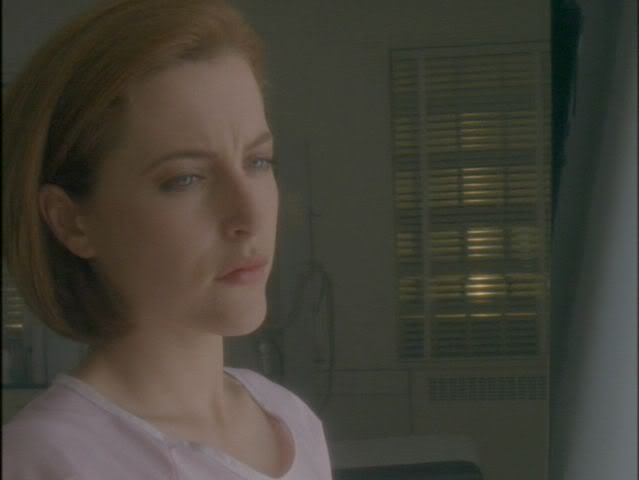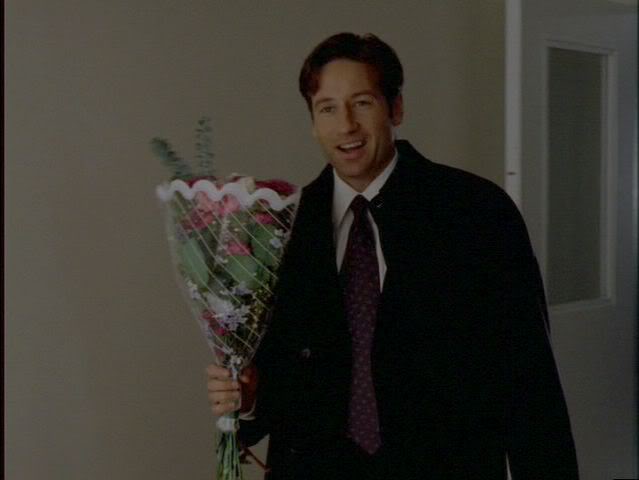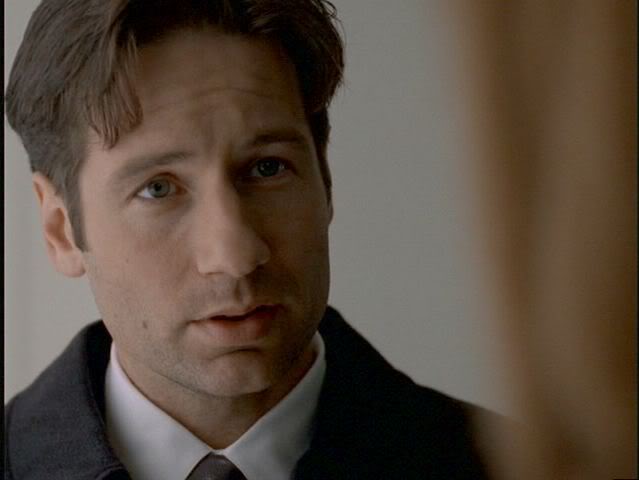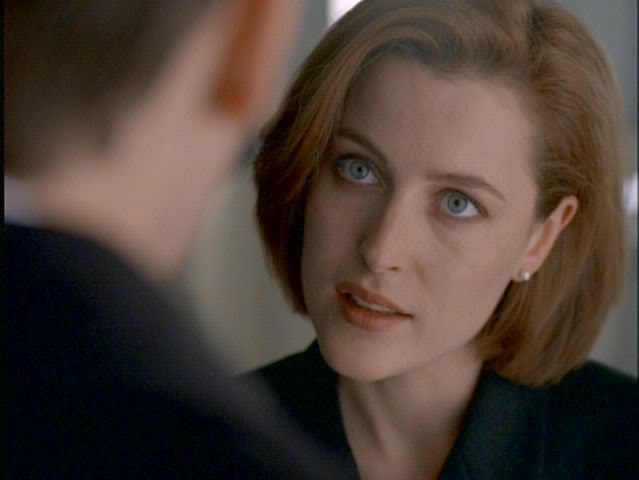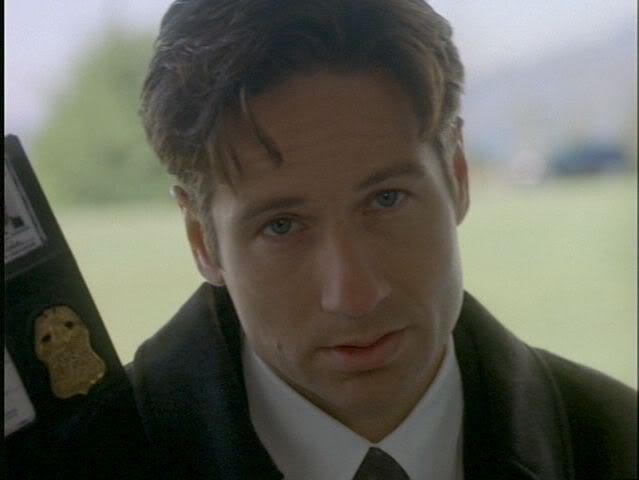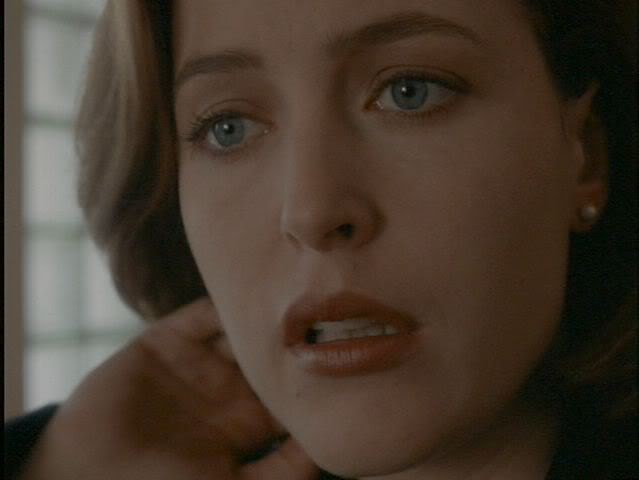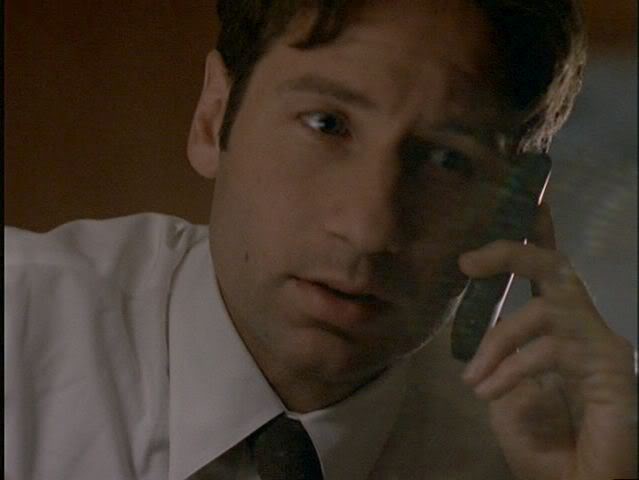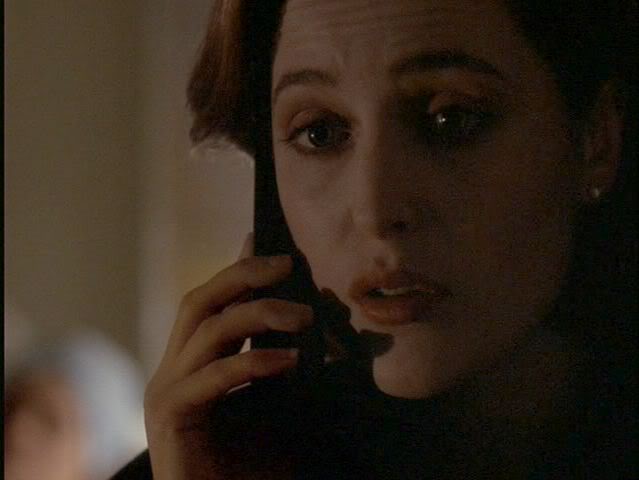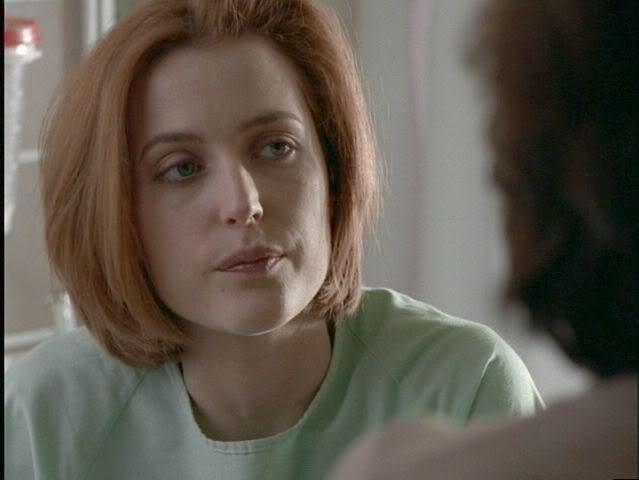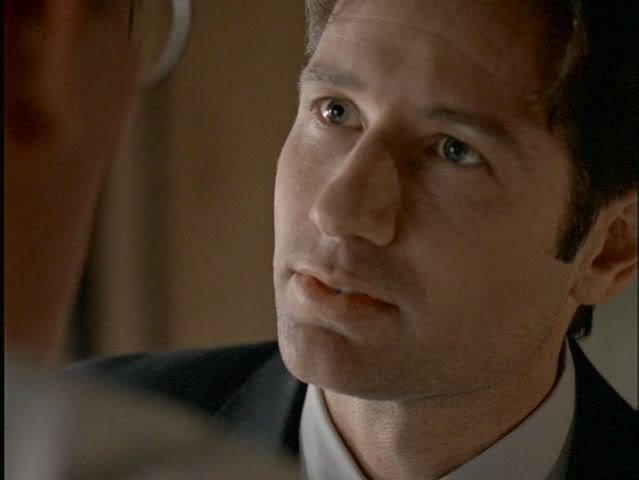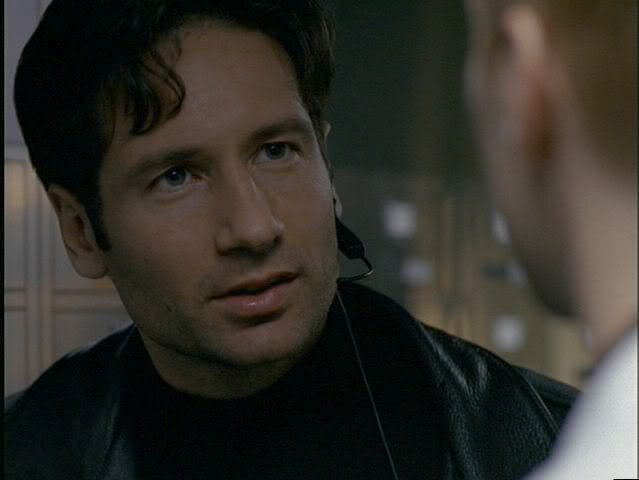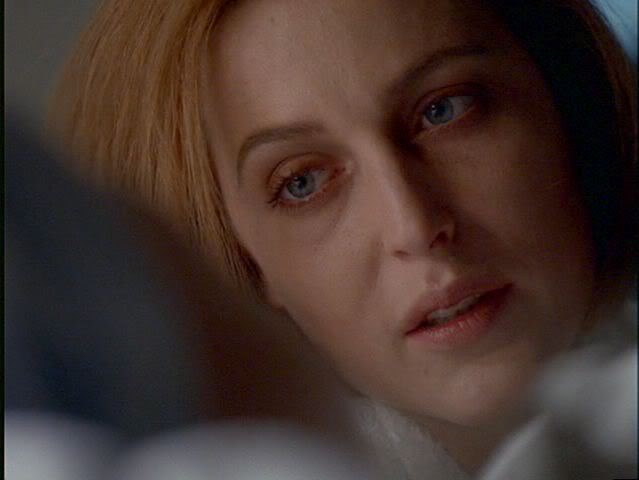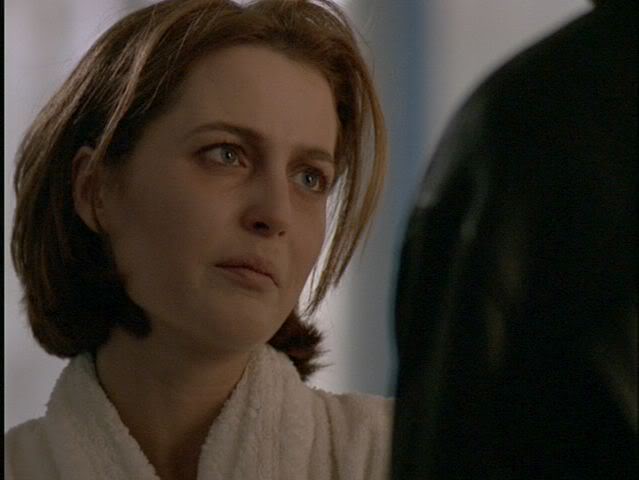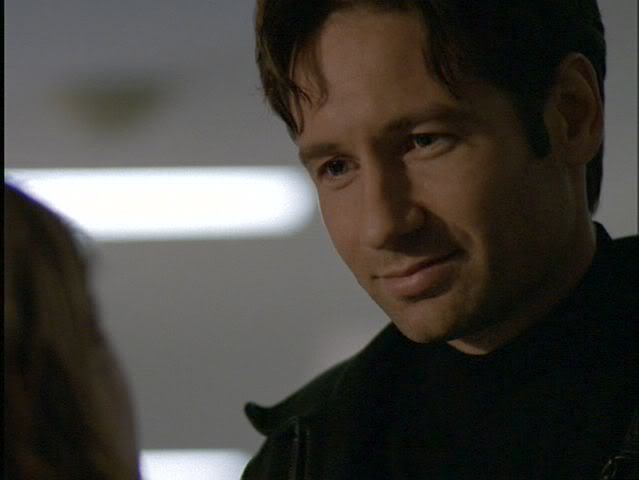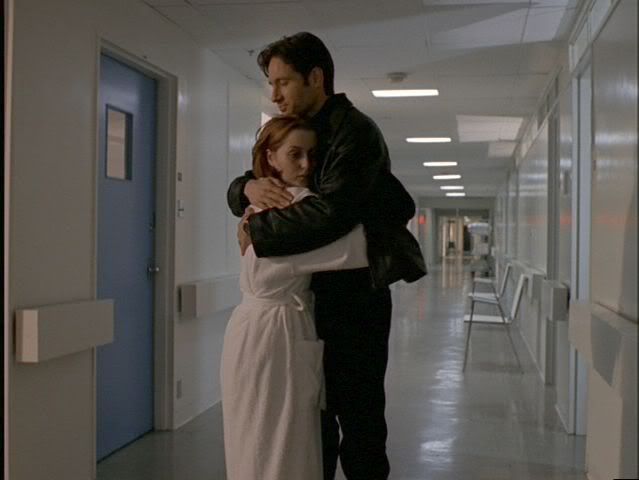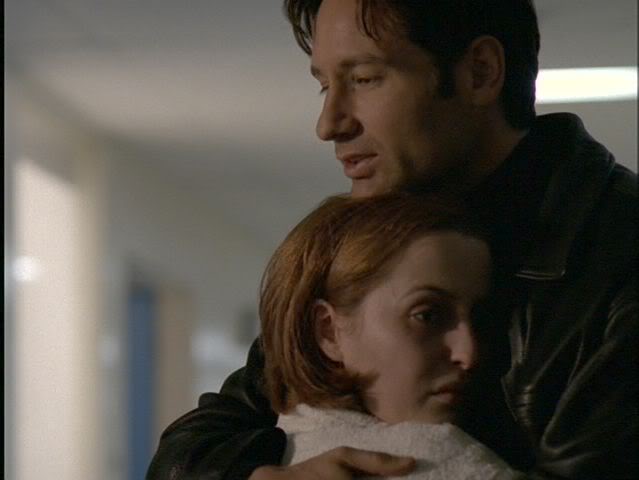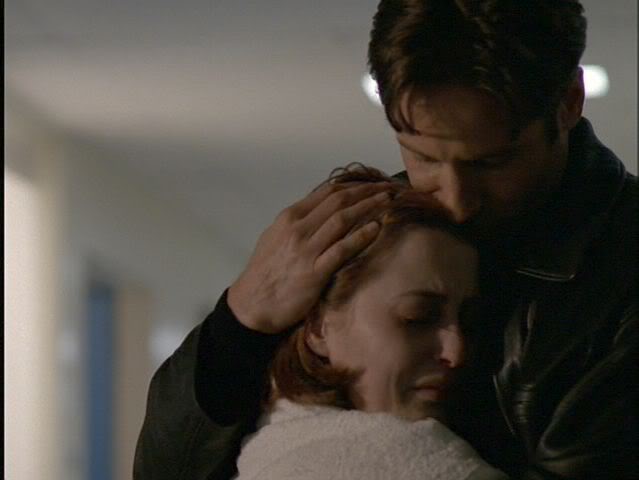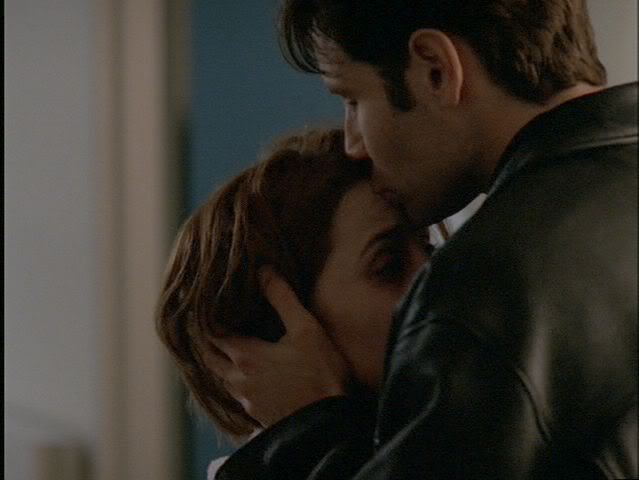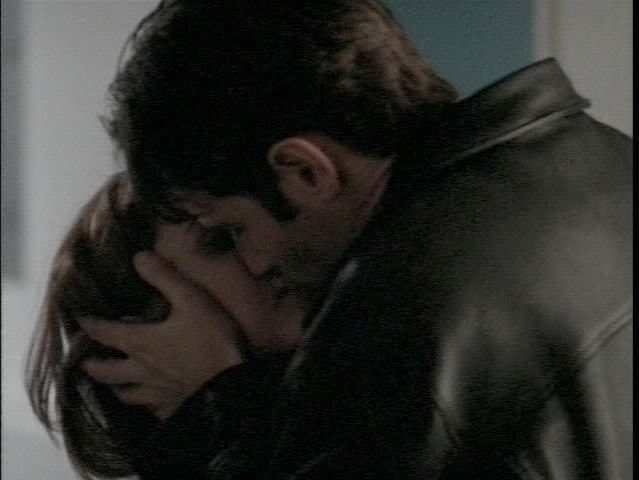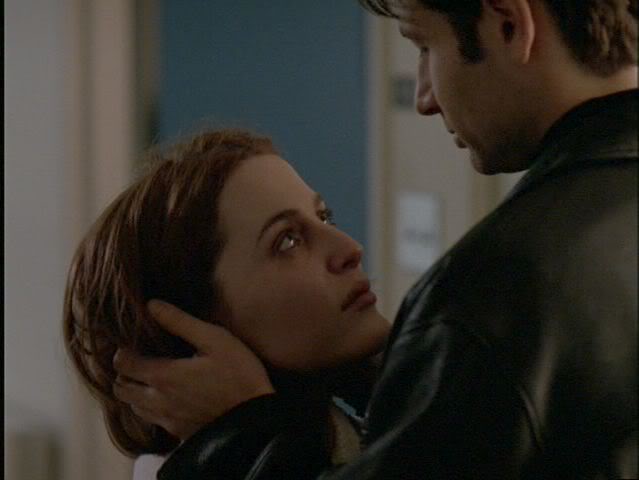CTP Episode of the Day - 10.23.06 - Memento Mori
Today's Cherished Episode: Memento Mori (4x15)
Original Air Date: February 9, 1997
Written By: Chris Carter, Frank Spotnitz, Vince Gilligan and John Shiban
Directed By: Rob BowmanScully learns that she has inoperable cancer -- of the same type that killed nearly a dozen female UFO abductees. While she undergoes radical treatment, Mulder works desperately to unravel the conspiracy behind her disease.
"For the first time, I feel time like a heartbeat, the seconds pumping in my breast like a reckoning; the numinous mysteries that once seemed so distant and unreal threatening clarity in the presence of a truth entertained not in youth, but only in its passage. I feel these words as if their meaning were weight being lifted from me, knowing that you will read them and share my burden as I have come to trust no other. That you should know my heart, look into it, finding the memory and experience that belong to you, that are you, is a comfort to me now as I feel the tethers loose and the prospects darken for the continuance of a journey that began not so long ago, and which began again with a faith shaken and strengthened by your convictions, if not for which I might never have been so strong now as I cross to face you and look at you incomplete, hoping that you will forgive me for not making the rest of the journey with you."
Some "Memento Mori" Tidbits & Musings:
(Frank Spotnitz recorded a commentary for this episode on the Season 4 DVDs. Rob Bowman recorded a commentary for this episode on the Black Oil Mythology Collection. Their words shared here come from those commentaries.)
-- "Memento Mori" is Latin and means "reminder of death" or "remember that you are mortal." In the days of the Roman Empire, a military leader achieving great victories would be given a parade through the city of Rome where he in the end was told Memento Mori, so that he wouldn't forget his place in the world.
-- "We decided early in Season 4 to give Scully cancer," said Chris Carter. "I had talked about it with Gillian the previous year, when we were discussing having her mother contract it. We were playing around with all of this because cancer provides an interesting platform on which to discuss many different things: faith, science, health care, and also a certain element of the paranormal -- the light at the end of the long passage; the coming and the going, and all that. Also, the whole cancer theme landed us very strongly into Season 5. It helped us tie together so many things in the two-parter that began the season. It helped everything play out very interestingly."
-- "The decision to give Scully cancer was a controversial one among the writers who were on staff in Season 4," said Frank Spotnitz. "Some didn't think it was a good idea. But when we started to discuss it over the summer prior to the start of Season 4, we felt it was almost obligatory because we'd already set up that there were all these other women who had the chips in the back of their necks who had contracted cancer and died and it felt like the other shoe had to drop, that Scully had to contract cancer to be consistent with the story that we'd set forward. Of course, it was an enormous decision to make in terms of her character and we weren't sure where it was going to take us or how we were going to resolve it. I guess the fears among some of the writers were that it would push the series into a melodramatic direction, but I think one of the things the series has done well is write against the melodrama and still been moving as a result."
-- But as the season began and progressed, the final decision about giving Scully cancer still had not been made by the show runners. As Spotnitz put it, a "happy accident" actually made the decision for them. "Darin Morgan had said he would write another episode for us; but while we were writing the episode prior to 'Memento Mori,' which was 'Leonard Betts,' Darin told us that he wouldn't have the script ready. So we were going to have to come up with another script, and the mad dash started to come up with a story. As it turned out, 'Leonard Betts' was about a human creature who needed to eat cancerous tumors to survive, so we realized that if we were going to give Scully cancer, this was the opportune moment. We could end 'Leonard Betts' with the discovery that Scully had something that Leonard needed, and we could make the following episode the fulfillment of that bad news."
-- "But we had very little time in which to write the show," Spotnitz continued. "It was right before the Christmas break and the script had to prep -- that is, the director and crew in Vancouver had to get the script and begin finding locations, casting actors, building sets -- and then we'd go away for Christmas and come back and the script would then go into production. So in about two days the four of us -- Chris, me, Vince, and John -- figured out the entire story, which was very fast for us. And then John, Vince, and I wrote the first draft before Christmas to get it out to the crew and the director, Rob Bowman. Then over Christmas, Chris went through and rewrote the script; so many of the lines in 'Memento Mori' are solely Chris's."
-- Carter had just finished his re-write of "Memento Mori" when Frank Spotnitz arrived in Hawaii, where he and Carter were spending their Christmas vacation. During the next 10 days, Carter and Spotnitz developed the story for the X-Files movie. "So 'Memento Mori' and the movie were born at the same time," Spotnitz said.
-- "I remember when Frank Spotnitz called me and told me about this episode that he and the guys were writing, and that it was going to be about cancer and very emotional," said Rob Bowman. "I was concerned because I felt that it was a bit of a departure. We had always showed a great deal of restraint in dealing with emotions, and I was concerned the cancer story would mean too much melodrama. Frank assured me in that phone call that 'Memento Mori' was going to be one of the more important episodes, that we would use the same restraint in exhibiting emotion as we had in the past, and it would all fit in quite well. I know the first time I read it I understood what he meant. Considering I had done many of the mythology episodes which were about holding your breath dramatically, this was going to be an interesting directing assignment for me. I don't have anybody in my family who's ever died from cancer, but I've had friends who have relatives who have died from the disease, so I wanted to treat it fairly and properly. It was a very interesting and different experience for me."
-- "Gillian was of course, I think, delighted about the decision to give her character cancer," Carter added, "if you can be delighted about being given cancer, because it was something new for her to play. It was an escalation of the character and by this point everyone had settled very comfortably, or uncomfortably, into their roles, being that they were asked to do a lot of the same thing, to play a lot of the same beats, because the show is primarily investigative and it's procedural. So, all of a sudden, when the story turns very personal like this, I think an actress sees that as a tremendous opportunity."
-- The lead actors, long attuned to Carter's sensibilities and how they translate into their respective characters, didn't need much coaching to hew to the proper dramatic line. "Sure Scully was scared by the disease," said Gillian Anderson. "But fear is not a good emotion to play on a constant basis. There was only so much of that I could do before it got ridiculous. And in one sense, that was useful, because it informed me that Scully was trying to avoid it in some way. She didn't want to deal with it until it reared its ugly head. Sure, sometimes she was scared. Sometimes she was overwhelmed. Sometimes I had to think of the things that I would lose, but I had to focus on what's right in front of me, making choices in my life so that if I had to go, I would feel that while I've been here I have accomplished something."
-- "We were very concerned about how Mulder might react to it, and we wanted him to react heroically," Carter explained. "But David Duchovny was insistent, and I think he was right, on making Mulder not too heroic, making him go through the variety of emotions that people can and do go through."
-- David Duchovny said, "When this script first came up I thought we had a chance to bring in a new dimension, one that wasn't symbolic or typical of an ideal relationship. I said, 'I don't want Mulder to play the "you're a brave little soldier," beat.' The actual truth of the matter is that when you do that you're hurting yourself, you're hurting everyone. I also wanted to get beyond 'You should really get home and rest,' which was soap operatic, and get into some true semblance of a human relationship -- which includes that people get angry with each other even when they're dying. Especially when they're dying. So I said to the writers: 'If there's anything I can do here, please let me be totally unsympathetic and be an asshole to her, because this is what people do. They go against their better instincts. They're not always princes in this situation."
-- "A very conscious decision was made to begin the episode with this surreal image of approaching a white light as if through a narrow tunnel," said Frank Spotnitz, "because that's the belief that when you are dying you see a white light and you approach as you get closer to death. Very slowly the image becomes less dreamlike and more literal until we see it is Scully."
-- "We try to put a lot of direction in our scripts," said Frank Spotnitz. "We 'board' them -- put index cards up on bulletin boards -- to try and think of all the images and even the visual transitions from scene to scene, and then we write them into the script. The idea is that the shows are so ambitious and the time and money is so precious, that if the writers can be as specific as possible about what the viewer needs to see, then the crew and director can prep more efficiently and we all have a better chance of actually getting the work done in the time we have."
-- To achieve the opening shot in the "infinite hallway," director Rob Bowman wanted to soften the image, so the walls were draped in large sheets of plastic similar to trash bags. "It allowed the image to liquefy," said Bowman, "and didn't make it seem so much like a hallway. I know when I went to shoot it, people thought I was nuts; they were scratching their heads wondering why I had these dark plastic bags hanging from this scene where Scully discovers she has cancer. But I had this vision in my head, and after we added all the visual effects to the softened walls, I think it went from seeming to be ridiculous to working out pretty cool."
-- The moving voiceover that accompanies the opening image was "100 percent written by Chris Carter," said Frank Spotnitz. "It's one of the nicest and most poetic of the many voiceovers he wrote over the course of the series." Spotnitz noted that once when Chris Carter was vacationing a girl swam up to him at the pool and proceeded to recite the entire voiceover to him, word for word. "It really took him aback," Spotnitz laughed.
-- Spotnitz explained that Scully's journal entries -- the opening voiceover and heard several times throughout the episode -- were a conscious choice to express Scully's affection for Mulder and what she was thinking "without having to have them say it to each other. So much of the Mulder and Scully relationship is unspoken, and I think that's why it's been so powerful for so long, and why there's been so much fanfiction devoted to it, because you can read into it an enormous amount."
-- "I thought David did a great job in the scene where Scully tells Mulder she has cancer," said Rob Bowman. "Mulder's always got this sense of confidence or surety about things, and in that scene we sort of pull up the oars and the rudder and smash the compass. You see Mulder losing traction and not being so confident, and that took the episode in a totally different direction. He's lost and concerned and it was a great choice by David to want to play it that way."
-- "Everyone anticipated that Gillian would do a great job with this episode and she did," said Spotnitz, "but I was surprised by how much David made this episode his own as well, starting with their first scene together. So much of the magic of his performance in this episode is his refusal to accept her condition. And that becomes as strong a position for him to take as hers is. You'd think that a show where one of the characters gets cancer would be solely that character's episode, but 'Memento Mori' functions very nicely as a Mulder and Scully show, I think in large measure due to the strength of David's performance and the choices he made in these scenes. What's nice about it too is that it is surprisingly unsentimental. He's playing against the melodrama; it's almost confrontational in his refusal to accept her illness. The secret of the success of this episode, and the entire series, is how much the characters don't say, how much emotion you know is behind what they're doing, not out front, and there's a lot of dramatic tension in that because you know how much these characters feel for each other without the characters ever having to say it."
-- Bowman used a brief visual flashback from "Nisei," directed by David Nutter, not so much to recall but to echo Scully meeting the other abductees in that episode. "We try to find artful ways to do flashbacks," said Frank Spotnitz, "because flashbacks are such a finger-pointing way to do things and we try not to do that. And Rob did a great job in this instance."
-- Rob Bowman liked the scene where Mulder and Scully found that someone was downloading data from Betsy Hagopian's computer. "I always get kind of jazzed in The X-Files when Mulder and Scully find clues or footprints or fingerprints. It's a little trigger to ignite them toward figuring out what little secrets people are hiding. You can feel the story taking momentum and the plot having some definition."
-- The scene where the agents chase down Kurt Crawford was supposed to be much more ambitious and complex, but there wasn't enough time to shoot it. "I don't know why I thought I could even attempt it," said Bowman. "So we condensed it down to the back alley. That was just the life of the show. It was very ambitious and we were always aiming quite high. Sometimes we pulled off miracles and sometimes we didn't. That night I didn't. But when I look at it now, it's fine. Only I'm aware of all the stuff that I didn't shoot."
-- "Rob did an amazing job," Spotnitz said. "All our episodes are enormously ambitious, a huge number of locations and beats in the story. A beat is a moment on screen where you need to cover it and give it its due and that's why it's been hard for directors to succeed on our show. The money and time you have on a television schedule usually aren't enough to get all the work done that you have to get done. The great directors we've had, like Rob and Kim [Manners] have been able to figure out exactly the moments they need, exactly what needs to be on camera, where you need close-ups and where you don't. And so much of visual storytelling is where you place the camera. It sounds simple, but it's not."
-- "Rob has been known to walk around the set and turn off the lights," Spotnitz continued, "always pushing the edge to see how dark we can be. He doesn't do flashy storytelling, doesn't want to call attention to himself. He wants to hold a hard frame and let the picture and the actors pull you through the story. It takes a lot of self-confidence as a director to direct that way, because it's not 'hey, look at me.' That's why he's so good."
-- Before deciding what type of cancer Scully should have, Frank Spotnitz consulted with his brother Seth Spotnitz, a neurologist. "I was looking for a particularly vicious type of cancer that would be incurable, inoperable, and virtually untreatable," he said, "but that would allow Scully to work without visible side effects for some time and would not affect her strength or appearance until its terminal stage. We decided on a nasal-pharyngeal tumor, which allowed us to use the nosebleeds to visualize in a non-melodramatic way what Scully was suffering from."
-- Kurt Crawford was named for the person at the FBI whom the show contacted with questions about accuracy and making sure the show reflected as much as possible true practices of the FBI.
-- "There's so much chemistry between David and Gillian," said Frank Spotnitz, "and I'm always struck by it again and again when I watch old episodes of the show. They are so different as private off-screen individuals, but there's something about them -- you just look at their eyes when you watch a scene. They really communicate with each other. Their eyes are moving and they're really listening to each other. You can watch an episode with the sound off and can just tell so much about the way they feel about each other."
-- The argument between Mulder and Scully about Scully's ability to continue professionally is "clearly about much more -- about how these characters feel about each other," said Spotnitz. "We are always looking for ways to set up ideas, and moments like this really do that. You need to set them up in the first act in order to pay them off in the fourth act. And this scene definitely sets up the hallway scene in the fourth act."
-- "The lurking truth throughout this story is that Scully really does have that tumor and she really is in trouble," said Bowman. "She's trying to keep a mask of stoicism and strength in front of Mulder, as she knows he's more emotional or unstable about it than she is. I think quite courageously she knows there's very little she can do about what's going on inside of her, but what she can do is find out why this is all happening to her, for what cause and what purpose. I just think it's much more interesting if the characters are on the stronger side of fear than on the weaker side of it. Throughout the episode on a daily basis Gillian would impress me with how she told the story of a woman with cancer. I don't know what research she did, if any. If she did, it paid off. If she didn't, it's a tribute to her instincts, which were always remarkable. I think behind it there's a degree of hope and not a maudlin sense of 'why me.'"
-- "The episode itself was a 'lucky accident' and so was Gillian Barber," said Spotnitz. "She had been cast in the very small role of Penny Northern in 'Nisei," and when it came time to do this episode we knew we wanted Scully to get to know one of these women who were sick, and we were lucky enough to get Gillian again. So her small part became very important. We knew we wanted that continuity. We try very hard to reward loyal and fanatical viewers by respecting the continuity from one episode to another, from one season to another. And indeed there are many episodes of The X-Files where you have to watch for years to see something get paid off. This episode has the harvested embryos at the end which didn't pay off until Season 8, four years later. This episode really didn't expand the mythology; it just played off all the things that had happened before."
-- "I had a long phobia of hospital bedside scenes because they tend to be transparently looking for emotional reaction," Bowman explained. "I tried to cut them out of every show I did, every script. I'd say, 'Please, can we not do it in a hospital room?' But once in a while you have to and this episode was one of those times. I tried to maintain a level of restraint so that the audience would feel the emotion and not the actors pleading for it. I didn't make that up, it's not my invention to say you should deal with emotion with restraint and let the audience participate. It's just what I tried to do."
-- Another great example of the Mulder/Scully relationship being defined by what is not said is the scene where Scully calls Mulder and asks him to call her mother. The way his voice breaks when he says, "I will be right there," and her slight grimace to keep from crying at his anguish is wonderful.
-- "So much of the characters of Mulder and Scully are reserved," said Spotnitz. "They don't want to let people in, they have shells you have to try and break through. You can really just see it in Gillian's face as you watch the scene between Scully and her mother. There's so much inside that she's not saying. Her mother's not that way, and that's what's so touching about that scene."
-- "That's one of the things I liked best about this episode," said co-writer John Shiban. "There's the mother's reaction, Mulder's reaction, Skinner's reaction -- everyone had a different take on it and everyone did something different in response to it. It gave us a chance to all have a different voice on the issue of cancer."
-- "Sheila Larken, [Maggie Scully] Bob Goodwin's wife, was both a great actress and a great friend during the years of The X-Files," said Bowman. "She played a surrogate mother to me for a few years, and I loved having her around. She's a feisty woman too. She really got hold of the scene confronting Scully for not telling her about the cancer, and she was fantastic."
-- "One of the things I love about directing in general and about directing The X-Files specifically was because of the many different kinds of stories that we told, I got to live in all these other fictional realities," Bowman said. "Here's me, a guy who grew up playing football in Burbank, California, a guy who likes 'The Wizard of Oz' and big movies, and here I was directing a scene about a mother and daughter dealing with the reality of cancer. Not a situation I'd been in before and hopefully would never be in again. It's not reality, but watching the scene play and having an emotional reaction to it was a very interesting part of my job."
-- "We thought one of the interesting things about this story was having Scully, who's a doctor, now being the patient with her life at stake, and that was very scary," said Spotnitz. "So that's why we included these nightmarish images of cancer treatment and had Scully describe it in the voiceover where she's recording it in her journal -- again, avoiding melodrama as much as possible. Voiceover tends to be anti-melodramatic because by definition the character speaking is removed from the situation. Yet in this case it's still very moving because the character is trying to be very heroic."
-- "In the treatment scene it was a very large prop that was wrapping around my star," recalled Bowman, "and in television things happen very fast. Writing is fast, shooting is fast, and construction is fast. I remember watching that thing rotate around Gillian's face and thinking 'I hope they put all those bolts in there nice and tight.'"
-- "We have characters resolve their emotional conflict through action, and this is what Mulder does here and that's what makes him a heroic character," said Spotnitz. "In mythology episodes, personal storylines become larger. By this time, the personal lives of Mulder and Scully were completely intertwined with the show. Melissa's death was what fully invested Scully in the cause even more so than her abduction which she wasn't convinced was the work of aliens."
-- "I felt better in the episode the way that the writers had balanced the hospital settings for the cancer story against I think good solid X-Files situations," Bowman said. "Lurking and flashlights kept it within what I call the visual vocabulary of The X-Files, and it didn't seem like a complete departure from the norm. We told the story through our usual X-Files prism, so it didn't seem to dwell in the solemn environs of the hospital."
-- Mulder used the word Vegreville as the password to enter computer records in the doctor's office; the real Vegreville in Alberta, Canada, hosts a tourist attraction in keeping with the theme of the episode: a giant (31.6 feet tall) Ukrainian Easter egg made out of metal.
-- The Vegreville snow globe was Chris Carter's idea. "It cost something like $2,000 to have that snow globe specially made," said Frank Spotnitz. "It was an incredibly expensive prop."
-- A scene showing more of Scully's nightmare of her abduction experience was cut from the final episode; but Spotnitz felt the brief scene between Penny and Scully (as Penny comforts her) was important in establishing the relationship between the two women. "Here's two women who could not be more different," he said, "Scully the skeptic, Penny the absolute believer, yet they have this humanity in common which Scully can't help but be moved by. Every episode you need to find the reason for telling the story, what it's about and sometimes you have a very conscious message and other times it's just a more human one. When I say conscious message, I don't mean trying to teach anybody anything; you just want an idea that makes it not just an exercise. You want there to be some point to the story, and I think the Scully/Penny relationship is very important to this episode because there was a bond. You really cared about this woman, and when she passes away you really feel something for her and you understand what Scully is facing."
-- Bowman noted that he staged the scene between Mulder and Skinner in an unfamiliar, informal way for a reason. "There's usually some friction or conflict between Mulder and Skinner that takes place in Skinner's office," said Bowman, "and they both dig their heels in. That's why I wanted to have David sitting on the back of the couch, lower than Skinner. Mulder is thrown off and struggling to find the right thing to do. And this staging allows him to get up and make his case to Skinner. But of course Skinner talks him out of it. 'You can't ask the truth of a man who trades in lies.' I love that line that Chris wrote. Chris has this extraordinary ability to phrase a characterization and this is just one example of something he did over and over again during the course of the series."
-- "Like so many of the supporting characters in The X-Files, Mitch Pileggi's rise on the show was completely unplanned," said Spotnitz. "It was solely due to his strength as an actor. He came on and nobody knew that he'd become such an important part of the show, but he was so good that we writers felt inspired to bring him back and back and back and he's really become a third lead in the series. William B. Davis (CSM) was another actor who made his part. He was cast in the 'Pilot' in a non-speaking role and most of the first season he said nothing. When he finally got a line, he was so good that we just kept writing more and more things for him to do."
-- "When Skinner, the man who's usually reluctant to choose a side and stands in the middle, comes to ask CSM for a favor, I put these two guys in the basement alone," said Bowman. "I think it was the first time we saw CSM in the X-Files office. I always felt it was like a lion and a hyena -- but you never knew which was which. One of the great things about this episode was having characters like Skinner and the Lone Gunmen sacrifice the things they hold dear to help Mulder and Scully and do what needs to be done in a time of impending crisis. When Mulder goes to the Lone Gunmen for help, I was also very specific with the staging. I wanted Mulder downstage looking up at the Lone Gunmen -- coming to them not so much for information this time but looking to them for support."
-- The first cut of the episode was long -- so long that an emotional performance by actor Pat Skipper, playing Scully's brother Bill, was completely excised. Skipper appeared again for the first time in the Season 4 finale "Gethsemene." The scene, which begins with Scully dreaming of her father's visit to her in "One Breath," was significant for several reasons in that Bill, Jr., voices his displeasure, or rather what he believes to be his parents' displeasure, about Dana choosing to be an FBI Agent instead of a doctor and that now she has paid for that decision with her cancer. He also indirectly blames Dana for Melissa's death and, finally, he mentions their other brother Charles. The deleted scene, which would have followed the scene between Skinner and CSM, is included on the Season 4 DVDs. Chris Carter's commentary on the deleted scene: "There is nervousness between these two siblings who are obviously not close, a scene meant to show the underlying tension in the Scully family about Scully's choices and it was very real because it showed resentments and anger and a certain pettiness that was under the surface, a nice scene, a sort of domestic scene for us on The X-Files, something we don't regularly do and in this case didn't do because we needed to cut time out of the picture."
-- "We were eager to give the Lone Gunmen something more to do in this episode," said Spotnitz. "They'd been great mouthpieces and helped a lot in exposition, but we wanted them to be more than talking heads and really get out into the field for the first time. This proved to be a precursor of what the Gunmen would do later in the show and in their own series, Mission: Impossible caper type stuff. Unlikely action heroes, to say the least."
-- "In terms of production, the scene of Mulder and the Lone Gunmen breaking into the facility was very hard to get," Spotnitz said. "We had to shoot it in pieces, different sets on different nights. But through the magic of editing, it seems like it was all done at the same time at the same place."
-- "It was funny because they had built a sewer pipe, of course, so we didn't actually have to go into a sewer pipe," remembered Dean Haglund (Langly). "It was just a really big cardboard tube with some lights running down it -- sorry to blow the illusion. But the space that they made was so small that all they did was just shove a camera on some sandbags down the tube and then handed me the little clapper board, and said, 'Okay, call it yourself.' So I had the little laptop, all crushed in there, and then I had to hold up the clapper board going, 'Okay, this is scene 18 take 2,' click, and then put it down and pick up my laptop. 'Mulder, are you OK?' OK, cut!"
-- "The X-Files grew up at the same time that the internet was growing up and computers were rapidly increasing in computing power," said Spotnitz. "And if you watch The X-Files from season to season, you'll see how much better technology got. We were always eager to use as much as was plausible."
-- "One factor that Chris was always conscious of was not wanting to make Mulder too much of a super hero," explained Spotnitz. "If you have a hero that is too competent, too capable, then it starts to seem unreal. These are huge forces against Mulder and Scully so you'll see that things are often accidental, like Mulder discovering that Scully's doctor is part of the project, and that's by design because it forgives the hero's achievements that he happens to see something, he falls into something. Mulder has fallen into a number of things quite literally."
-- "Scully is trying to find rationale and some peace of mind through her journal, but it's the parallel action of Mulder and the boys breaking into the facility that adds urgency," Bowman said. "Scully's fading into darkness, but our guys in the facility bring her situation to the forefront. I didn't want to abandon the emotional residue from Scully's scenes, but these parallel scenes allowed me to temper the action and shoot it so we could still feel Scully."
-- Green screens, split screens, body doubles, and a lot of cinematic tricks were used to create the cloning room set. "This was one of my favorite sets by Graeme Murray," said Spotnitz. "As we said, there were no real new mythology elements in this show. We took the same pieces we already had and elaborated on them. The tanks harkened back to 'The Erlenmeyer Flask' in Season 1 where Mulder first saw them."
-- To create the Orwellian ovum depository that played such a prominent part in the episode, art director Graeme Murray went way beyond the bounds of conventional TV-series set design. For instance, the refrigeration units were not painted plywood; they were custom-made cabinets constructed of stainless steel and machined aluminum. The entire art department worked fanatically on designing the most minute details of the drawers and handles.
-- "I was shooting the cornfield sequence for Fight the Future when I got a phone call that Graeme Murray won an Emmy for this episode," said Bowman. "The episode was beautifully designed through and through, and it showed what Graeme could do with very little time and very few resources just through his imagination. But I don't think it won because it was the best designed episode in all of television; I think it won as a tribute to Graeme's work week in and week out."
-- The date on the drawer holding Scully's ova was November 29, 1994 -- the date she was returned to the hospital in "One Breath."
-- "The X-Files is a hybrid of so many different genres," said Spotnitz. "Horror, science fiction, suspense, thriller, mystery. We pride ourselves in trying to create movie moments on television each week, and I think Mulder's escape from the facility is a great example of that."
-- "After all his work, Mulder shows up at the hospital and he thinks it's too late," said Bowman, "which I think is an idea which is reflective of real life. You can work hard, try everything, do everything right, cross your t's and dot your i's and it still ain't gonna add up to the result you wanted. This is not the type of performance that David has an opportunity to do very often, where he's not just angry or trying to shed light on people who have lied, but there's an emotional subtext to this performance that was beautifully done and quite refreshing."
-- "One of the tricky things about the show is determining how much information to withhold from the characters and how much to withhold from the audience," said Spotnitz. "When Mulder returns to the hospital, he sees the journal that Scully's been keeping. The journal is a narrative device on the one hand because it helps you tell the story in a compressed way, but it's also very personal and speaks to Scully's emotions about Mulder which she would never say to his face, and confirms the unspoken affection. Mulder later discovers the journal and reads it, and she never meant for him to."
-- "We wanted Mulder to discover the journal within the episode so that those emotions could be completed within this hour of television," Spotnitz explained. "Mulder had to be privy to what Scully was thinking in order to have the payoff -- so that the moment in the hallway felt earned. They both have to be on the same page emotionally and both have to understand what's happened in the past hour."
-- The handwriting in the journal is not Gillian Anderson's. "But we do try to find handwriting that's appropriate for the characters," said Spotnitz.
-- "Then we have the completion of the journey with Penny," said Spotnitz. "You know as Scully is looking at this woman's fate that she's got to be thinking about her own fate, knowing this is what lies ahead for her, even though she would never say it. We trust the audience to connect the ideas. We lay them out and know the audience will have the intelligence to connect them themselves. People are grateful to you when you respect their intelligence which we try to do. You can't be smart enough for the audience. I'm always amazed at how perceptive and critical people are in a good way. It's very hard to write smart characters, and Mulder and Scully are such smart characters. Of course, David and Gillian are also very smart actors which helps keep us honest."
-- "I think the shot of Mulder sitting in the hallway was a perfect visualization of where Mulder is in the story," said Bowman. "I don't remember whether it was in the script or I made it up, but it wasn't a stroke of genius on my part. It was very clear that this was his state of mind in the story. Our writers make it very easy for the director to express the story visually. And the final scene between them is just remarkable. Scully dressed all in white, very afraid and sad, and Mulder dressed in stealth black, in great contrast to what's going on inside him. The affection that lives in this scene between the two characters is amazing, with Mulder having to support her and show some strength here when actually Scully's the strong one."
-- Bowman continued, "I remember shooting this scene and feeling privileged to work on a show that had such a great variety of stories we could tell and how well we could do them beginning with the ideas of the script through the execution of the writing, the production, and then standing there with the actors filming it. And I'm sure I was choked up to watch not only the quality of the scene but how talented these actors are. This was a show where we got to shoot submarines and spaceships flying, and I think we did those as well as anybody, and then we got to do stuff like this too -- and I got to be there and I got to shoot it and it'll be around forever."
-- "Scully's rationale for why she was going to continue on and go back to work was of Chris's devising and thinking," said Spotnitz. "It's part of what makes these such romantic heroic characters. They always put their personal lives on the back seat. In fact, they really don't have much in the way of a personal life whatsoever. They're people on a quest; they are both separated and united by their quest. Just look at the shot and you know these people love each other; they don't need to say it. She has to go back to work for herself, for the cause."
-- "The hallway scene became notorious because in one of the takes Mulder and Scully did kiss on the lips," said Frank Spotnitz. "And it was very nice and very effective and it was not scripted and we thought and thought about it and finally we decided not to use that take. And as so many things have gotten out over the internet over the years, this information did indeed get out over the internet and there were some people who were upset with us for it, but I still think it was the right decision. Again, it's so much of what the characters don't say, it's also so much of what the characters don't do that is so important. And this was so intimate and personal and their eyes tell you so much about how they feel about each other without having to have them kiss on the lips. They embrace, and have a forehead kiss, but it felt like the kiss on the lips would be sending the wrong signal at this moment and distract from the emotion of it."
-- "There were obvious reasons for deleting the first kiss on the lips between Mulder and Scully," said Carter on the Season 4 DVD while commenting on the deleted scene (which is included on the DVD). "It wasn't scripted and the actors decided to give it a try. It was something that we had wanted to preserve; it was something we knew we wanted to play with in the movie. So when we saw it in the episode, all of us were surprised and quickly made every effort to make sure no one would ever see it. So you see Mulder and Scully hugging but not kissing on the lips. As it turned out, we wouldn't have them kiss on the lips until Season 6."
-- As Frank Spotnitz noted, at the beginning of the season some of the writers had reservations about the cancer storyline, partly because it would create sympathy and allow the characters to collapse gooily in each other's arms. "I do not write gooily," said Carter with a laugh. "I've already had people say, 'You've got to give the audience that moment, they're expecting it,' but I try to keep away from it as long as I can. But it's absolutely plain that Mulder and Scully love each other -- in their own way. And it's the best kind of love. It's unconditional. It's not based on a physical attraction, but on a shared passion for life and for their quest. These are romantic heroes, romantic heroes in the literary tradition."
-- "Every episode of The X-Files we try to answer some questions and ask new ones," said Spotnitz. "At the very chilling ending of 'Memento Mori' we put Skinner back in a snare that he escaped from for a season or two, having to make a deal with the devil which he warned Mulder not to do. The camera takes it's time, a puff of smoke and there he is. That shot is so simple, but so well thought out and perfectly executed. It looks easy, but it's not."
-- "Memento Mori" was nominated for an Emmy for writing, "which we all were thrilled and surprised by," said Spotnitz, "but there were lots of amazing parts of this episode, including Rob's direction. It always amazed me that for the most part, our directors weren't recognized by the Academy -- neither Rob Bowman nor Kim Manners were ever nominated for their work."
-- "Memento Mori" was the episode submitted to the television academy to represent The X-Files in the 1996-97 Emmy Awards competition. In addition to the nomination for writing and for art direction (which Graeme Murray, art director Gary Allen, and set decorator Shirley Inget shared), the series was also nominated for Best Drama. Both Duchovny and Anderson were nominated for Emmy Awards for their work during Season 4, and Anderson won the Emmy partly based on her performance in this episode.
-- Once & Future Retreads: Gillian Barber (Penny Northern) played the same role in Nisei, and was also Beth Kane in "Red Museum" and Agent Nancy Spiller in "Ghost in the Machine." Morris Panych (Gray-Haired Man) played the same role in "Piper Maru," "Avatar," "Herrenvolk," and "Zero Sum"; he was also Dr. Simon Auerbach in "F. Emasculata." Sean Allen (Dr. Kevin Scanlon) was Customer #2 in "War of the Coprophages."
-- "'Memento Mori' was one of my highlights of my time on the show, one of my favorite episodes because it does so many things well. It had a moving and personal story, great performances by all the actors, great production values, and featured some of my favorite characters. We did a number of things we'd never done before, and yet didn't really expand the mythology of the show. Everything that happened, all the science fiction elements were things that we'd already established and we just did something new with them which I like quite a lot. So to me it was a great synthesis of everything that came before it and set a real high mark for the show."
(Thanks to chrisnu for today's pics.)
Please share your first impressions, favorite (or cringe-worthy) moments, classic lines, favorite fanfic, nagging questions, repeated viewing observations, etc., as today we celebrate "Memento Mori."
Polly
